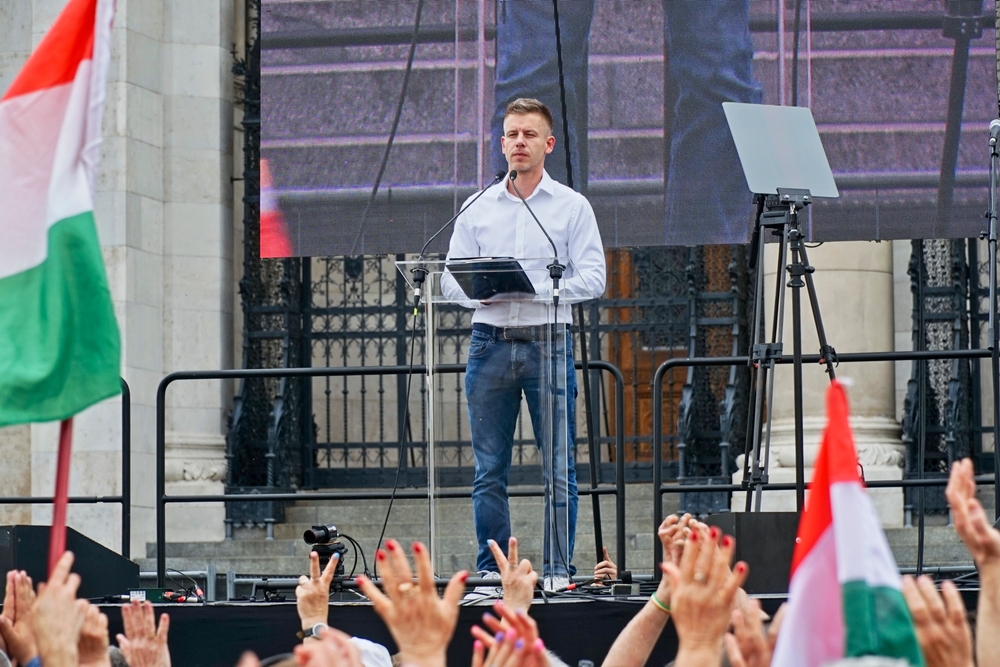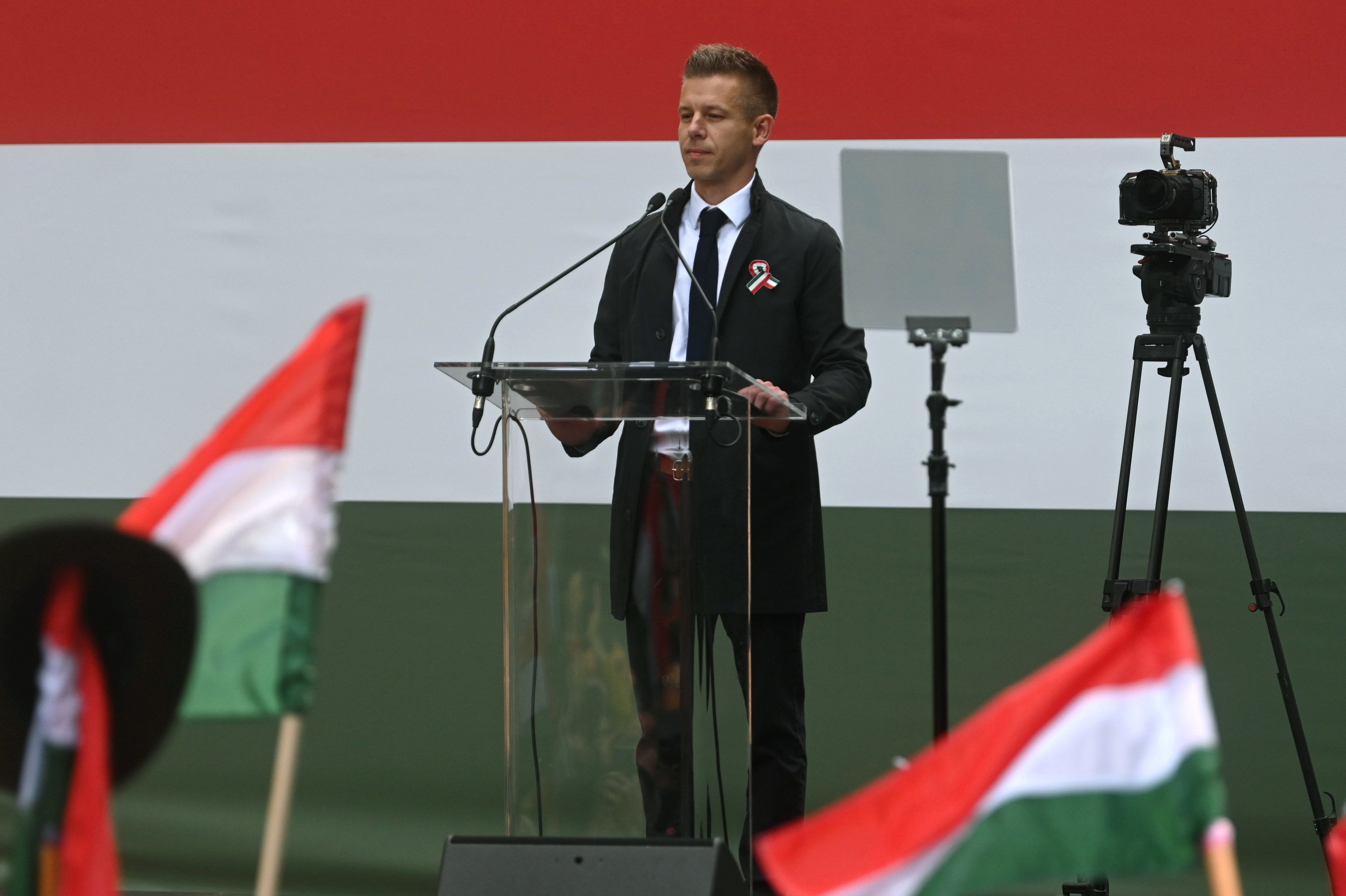Election battle enters final stretch as April 3 approaches
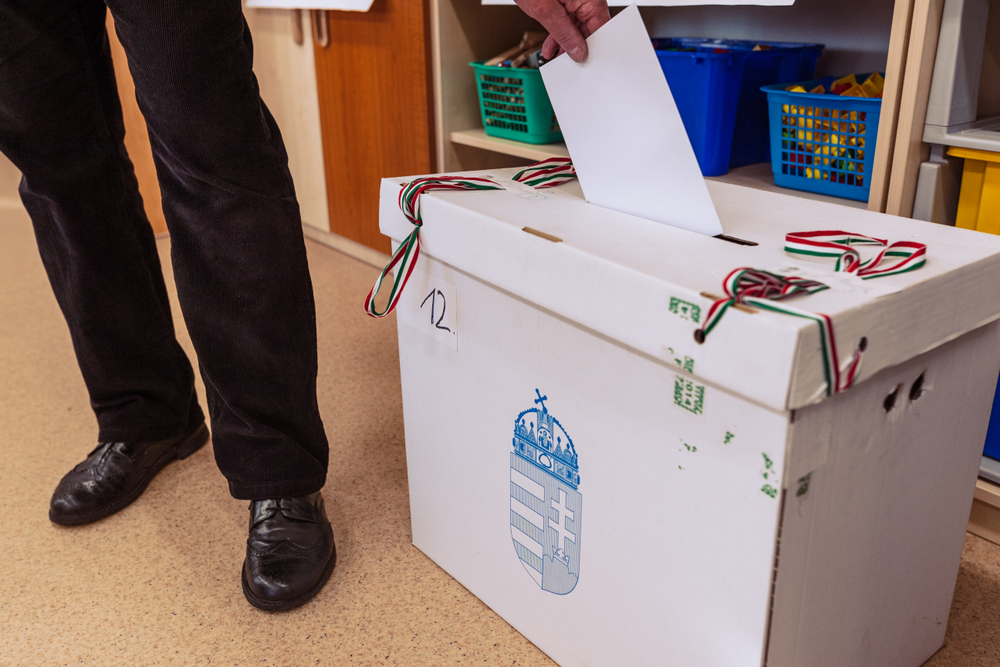
Image by blackcatstudio / Shutterstock.com
The governing Fidesz-Christian Democratic People’s Party (KDNP) coalition, spearheaded by Prime Minister Viktor Orbán, appears to hold a slight lead over the United for Hungary opposition list, led by Péter Márki-Zay according to the latest polls, but the rapidly developing events both in Hungary and abroad may just shake the race up a bit before election day on April 3.
Polls conducted by major pollsters in February vary between a 7-point Fidesz-KDNP lead according to Nézőpont, and a 2.8-point United for Hungary advantage, measured by Publicus; most forecasts, however, predict a victory for the incumbent government.
However, this year is still set to be the tightest race since 2006. After the Fidesz landslide of 2010, the fragmented opposition parties refused to coordinate and create a joint list of MP candidates resulting in supermajorities for Orbán in 2014 and 2018.
How the system works
Hungarian elections have been conducted in a one-round, two-ballot system since the electoral reform of 2012. On the first ballot, voters pick their local MP representing a single-member district. The winner is determined using the first-past-the-post system. A total of 106 out of 199 parliamentary seats are taken up by the winners of such local races.
On the second ballot, Hungarians vote for a party list of 93 candidates. These seats are calculated based on the sum of votes for the party-list and “leftover” votes from the first ballot, meaning votes cast for unsuccessful candidates and surplus votes for winning candidates also count towards the final result. Individual parties need to reach the 5% parliamentary entry threshold to receive their party-list seats in the assembly. That rises to 10% for joint lists of two parties and 15% for common lists of three or more parties.
In 2018, Fidesz-KDNP achieved a two-thirds supermajority despite receiving less than 50% of total votes, thanks to winning most of the single-member districts, especially in the countryside, where opposition votes were heavily divided between multiple candidates running in the colors of the then-disunited opposition parties.
In the orange corner
Since the start of the campaign (which officially began last month but has in reality been waged since the opposition primaries), the government and the opposition have adopted vastly different strategies to garner votes.
Before the conclusion of the opposition primaries, the ad campaigns of Fidesz and pro-government talking heads focused mainly on the Mayor of Budapest Gergely Karácsony, portraying him as an incompetent leader controlled by Ferenc Gyurcsány, the founder of the Democratic Coalition (DK) party.
The victory of Márki-Zay was unexpected, but the attack ads continued following the same themes, borrowing ideas from the comedy movie Austin Powers, portraying the opposition leader as “Mini Feri,” the “Mini-Me” version of the divisive Gyurcsány.
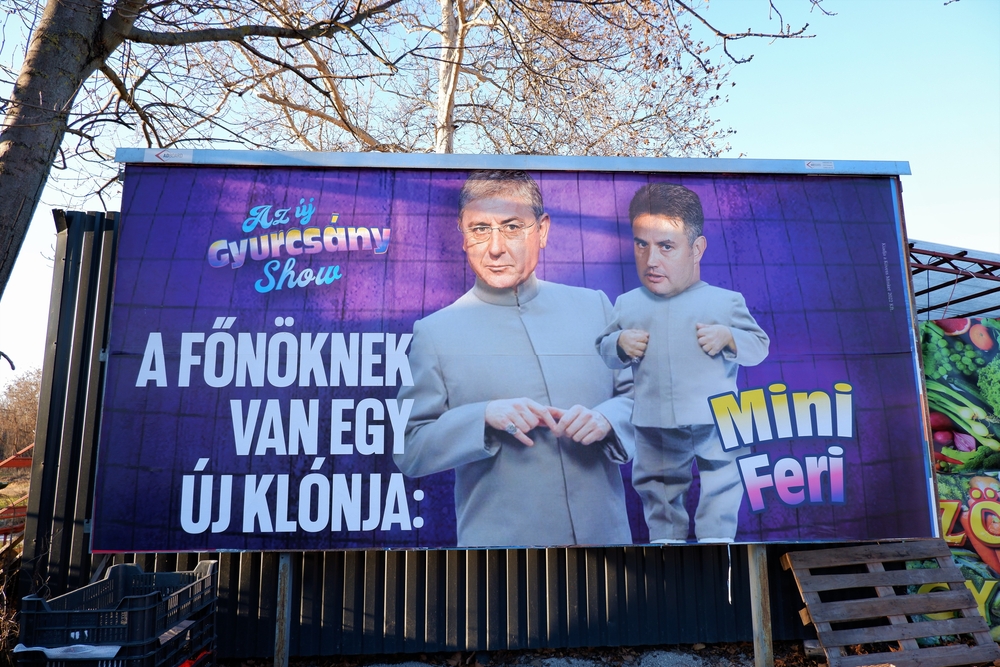
The billboard reads "The new Gyurcsány show. The boss has a new clone: Mini Feri." (Image by Raketir / Shutterstock.com)
The popularity rating of former Socialist Party Prime Minister among the general electorate stands at just 29 on a scale ranging from 1-100, according to research by Závecz published earlier this month.
Márki-Zay’s popularity stands at just 32 points, well behind Orbán’s 43 points. Márki-Zay dismissed the poll, telling InfoRádió that he thinks one of the opposition parties ordered the research, which shows him less popular than most opposition figures, to raise a scapegoat in case of a poor election showing.
Meanwhile, Orbán is doing his best to portray a calm, competent leader, smiling at people from countless billboards across the country, avoiding mentioning Márki-Zay’s name, and refusing to participate in a public TV debate against him. He appears on Kossuth Rádió every Friday, has visited the border area to talk to Transcarpathian refugees, and chairs regular security meetings.
Standing in front of tens of thousands of supporters at the March 15 Peace March, he bashed the opposition, which he often just calls “the left,” although Márki-Zay himself is a conservative, and Jobbik, while less nationalistic than 10 years ago, is still a right-wing party. Orbán also urged for calmness concerning the Russo-Ukrainian conflict, saying that Hungarians must not be caught between the “Russian hammer” and the “Ukrainian anvil,” adding that this is why Hungary will not send weapons or soldiers into the conflict zone.
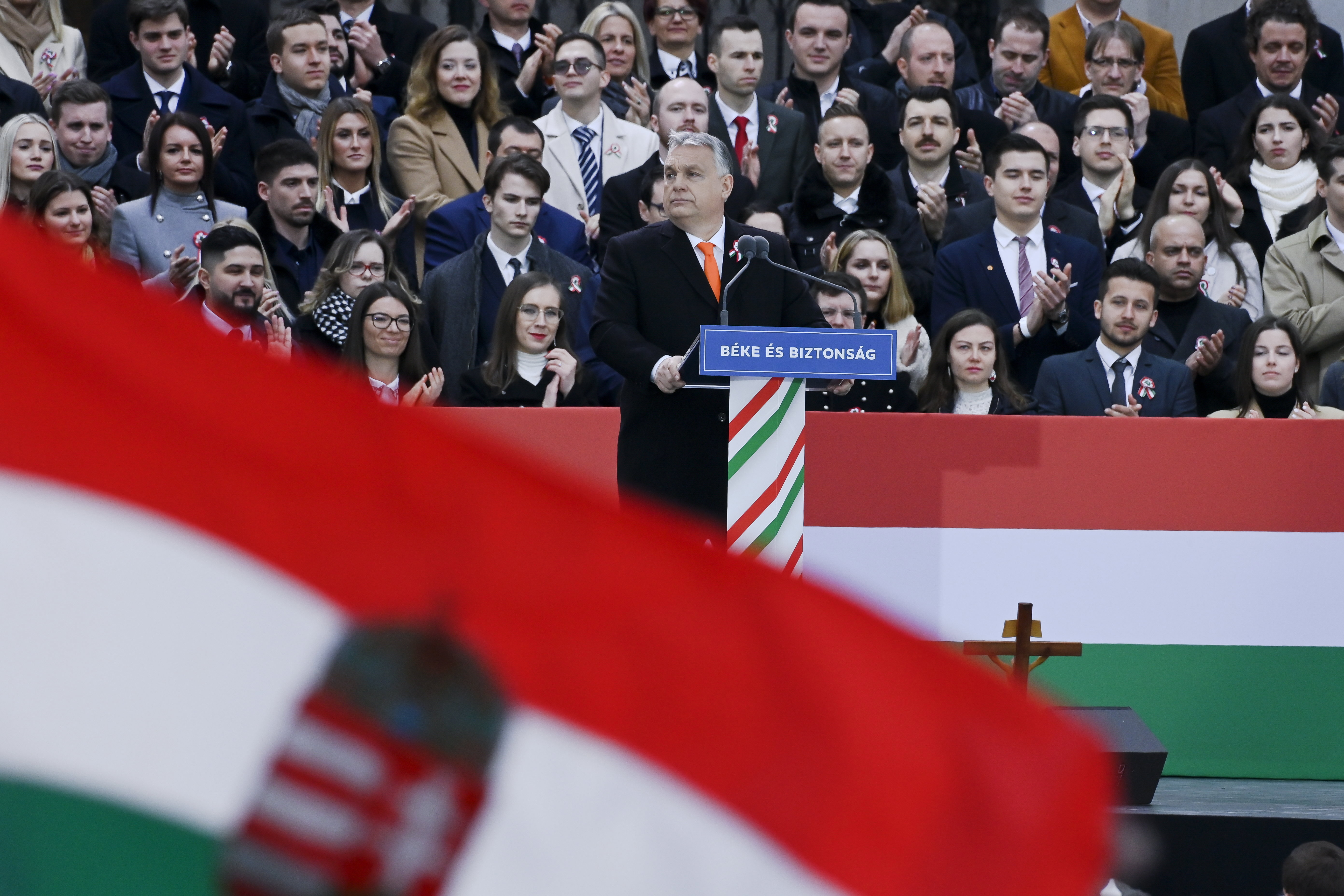
Viktor Orbán addressing the crowd on March 15. (Image by MTI/Szilárd Koszticsák)
“Hungary lies on the border of worlds; wars are not fought for us and not in our interests, and whoever wins, we lose. Central Europe is just a chessboard for the world’s great powers, and Hungary is just a pawn on it. If their goals so desire, they will sacrifice us,” Orbán said according to hirado.hu. He also claimed that “the left” would drag Hungary into the war.
While Hungary, unlike many EU nations, has not sent weapons to aid Ukraine against the Russian invasion, it is sending humanitarian aid and has been on board with EU sanctions on Russia. In addition, while talking up the necessity of Russian gas shipments, the government now downplays the friendly relations between Orbán and Putin, who have met no fewer than 11 times between 2010 and February 2022, most often in Moscow.
On the home front, the government introduced price controls for several commonly-used food items like cooking oil and chicken breast, as well as a price cap on gasoline and diesel to battle the inflation rate, which surged past the 8% mark in February. Both measures will end in May, just a month after the election.
Another strategic move by the government is organizing what they dub a referendum about child protection, which includes four questions:
- Do you support the teaching of sexual orientation to minors in public education institutions without parental consent?
- Do you support the promotion of sex reassignment therapy for underage children?
- Do you support the unrestricted exposure of underage children to sexually explicit media content that may affect their development?
- Do you support the showing of sex-change media content to minors?
The President of Hungary scheduled the referendum to take place on the same day as the election, which might boost turnover and get uncertain right-wing voters to the polling booth to vote with four “Nos.”
According to pinknews.co.uk, 10 Hungarian LGBT+ and human rights groups have called for voters to give invalid answers to the referendum, marking both “yes” and “no” for every question to “help ensure that the government’s exclusionary referendum does not reach the validity threshold.
The challenger
On the morning of March 16, the opposition candidate for PM was allowed to appear on state news channel M1 for the first time during the campaign, albeit only for five minutes.
“Thank you very much for giving the entire Hungarian opposition the opportunity to speak for five minutes in four years, I am here representing about 2.5 million-3 million people,” he started his monologue. He denied accusations he would cut the 13th-month pension, abolish free healthcare, and end the utility cost reduction program while advocating for the introduction of the euro to curb inflation and claiming that Orbán had promised British PM Boris Johnson that Hungary would send military aid to Ukraine.
“They are hiding the truth from you, that I am actually a conservative Christian father of seven. That I was a conservative before Viktor Orbán,” he added.
Without his own party, lacking the financial strength of his opponent, while also heading a big tent coalition, Márki-Zay is following a vastly different approach than Orbán. He goes on the stump around the country, visiting multiple locations in a day, broadcasting his events live, meeting with Hungarian expat groups in England and Germany, and answering questions from the Hungarian Reddit community.
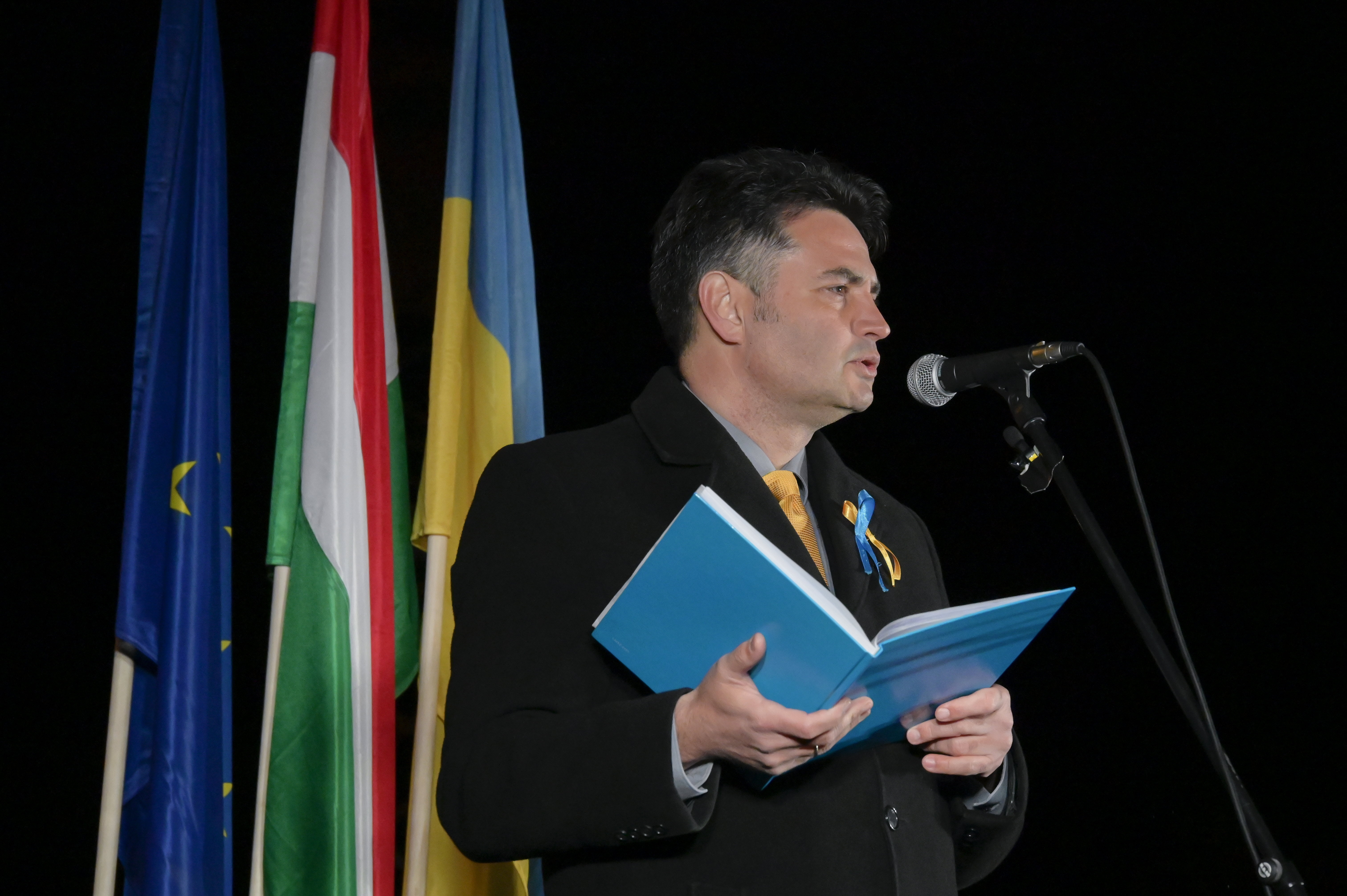
Péter Márki-Zay speaking at a protest against Russian influence in Hungary front of the International Investment Bank HQ in Budapest. (Image by MTI/Szilárd Koszticsák)
However, Márki-Zay’s high-intensity campaign and tendency to improvise have also resulted in gaffes that have been exploited by the pro-government media and talking heads on social media. One such example occurred at a campaign forum in Fonyód in February.
According to 24.hu, while talking about how Orbán’s political views had changed over the years, he argued that he used to go to church every Sunday in the 1980s, while Orbán was politically active in the Hungarian Young Communist League.
“Later he became a liberal, then he became a conservative politician who I supported very much, anti-Putin, pro-Europe, and now he is a pro-Putin, anti-Europe politician,” he said.
“But what Viktor Orbán embodies in one person, this rainbow coalition, so to speak, of liberals, communists, conservatives and fascists, we represent separately in the alliance,” Márki-Zay said of the alliance backing him, suggesting that it represents fascists and communists as well. While he did release a clarifying statement on social media soon after, the damage was already done.
The opposition also held a rally in Budapest on March 15, attended by tens of thousands of supporters. Márki-Zay himself spoke about April 3 being a choice between the East and Europe.
According to a report by telex.hu, he said that “Because of Orbán’s selfishness and lust for power, we voluntarily chose the backward East over the developing West.” He added, “We voluntarily went back to the wrong side of history.”
He also embraced his underdog status. “I’ve never won an opinion poll, and I’ve never lost an election.”
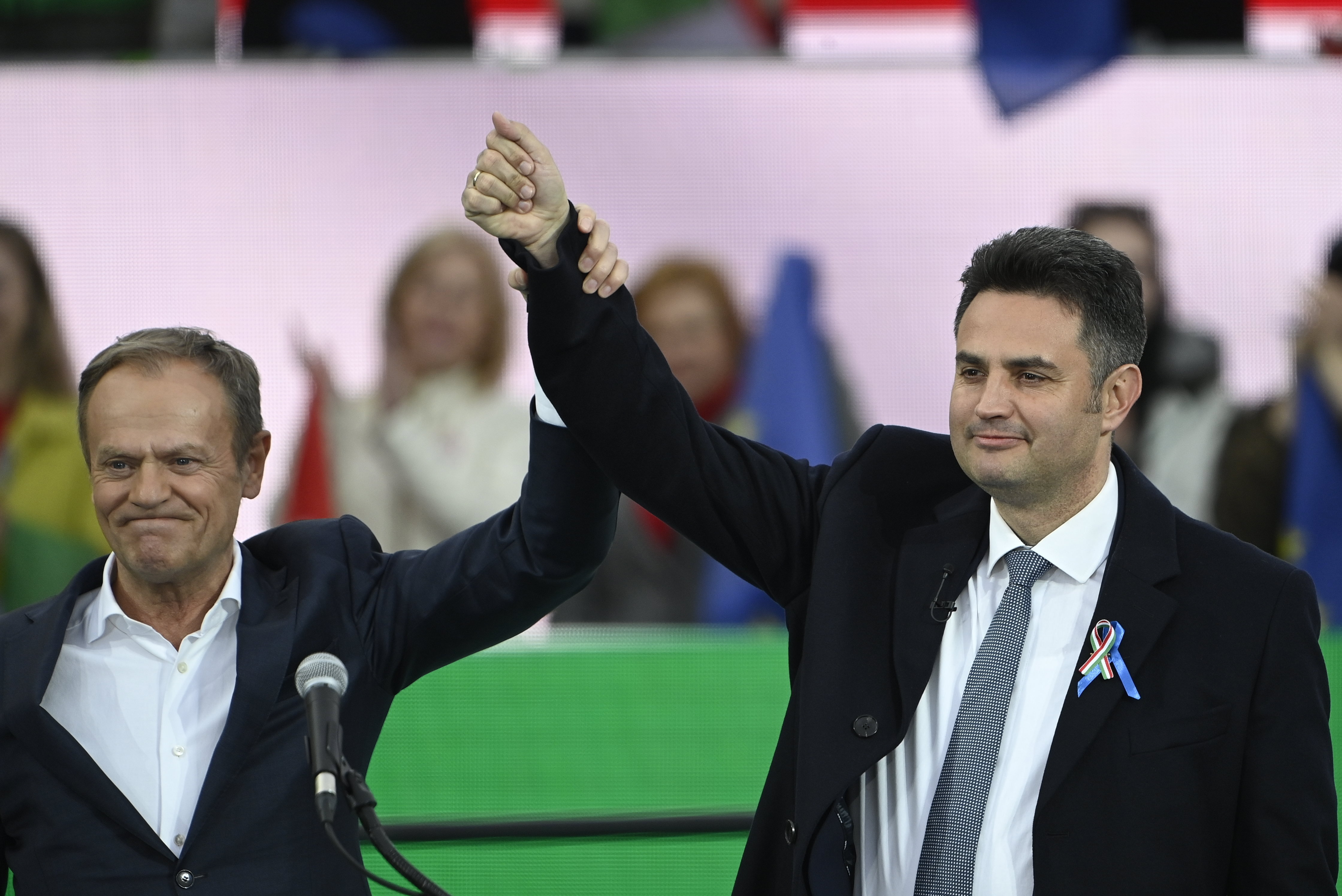
Donald Tusk and Péter Márki-Zay. (Image by MTI/Zsolt Szigetváry)
The rally also featured Polish opposition leader and former President of the European Council Donald Tusk, who focused on the relationship between Orbán and Putin in the context of the Russo-Ukrainian War. He argued that Orbán had given Hungary a reputation as having the “the most pro-Putin government in Europe,” according to notesfrompoland.com.
While there have been multiple attack ads on Fidesz in the past few months, they lacked a single focus until recently. Some videos accused the government of corruption, while billboards claimed Orbán is afraid of a televised debate with Márki-Zay because the PM is lying. There were even Youtube ads reminding voters about the infamous Szájer sex scandal involving a prominent Fidesz MEP who had been heavily involved in rewriting the constitution.
However, the criticism of Orbán over his warm relations with Vladimir Putin seems to be the latest theme, with activists altering those Austin Powers-inspired billboards to show Putin as Dr. Evil and Orbán as Mini-Me rather than Gyurcsány and Márki-Zay. According to a report by 444.hu, on the route of the pro-government Peace March, several posters with Orbán and Putin popped up, such as one depicting the two leaders standing close to each other with the text “Putin or Europe? Vote on April 3!”
Decades where nothing happens and weeks where decades happen
Even without the Russo-Ukrainian War, the speed and intensity of the campaign were steadily increasing. The invasion inserted a level of uncertainty into the race and, to some extent, shifted the focus towards foreign policy rather than domestic issues. While the polls in February suggested that Orbán was cruising towards a simple majority in the assembly, several important questions arose in the past few days that may influence the final results.
Will the public agree with the government’s decision to stay out of the conflict as much as possible and avoid sending weapons to Ukraine, or will they agree with Márki-Zay’s idea of more closely toeing the NATO line? Will the voters punish Orbán for his positive relations with Putin? Will there be more incidents like the flight of the Soviet-era drone through Hungarian airspace? Will the conflict move closer to the Hungarian border, or will a peace settlement be reached?
Naturally, domestic issues can still shape the minds of voters. Will voters chalk up the high inflation rate and the weakness of the forint to international factors, or will they blame the government? Will Márki-Zay’s maverick, Christian-conservative persona resonate with more right-leaning voters, or will it just alienate the left? Will the opposition candidate commit any more costly gaffes, or will there be a bombshell scandal on either side?
The definitive answers will only become apparent as the results start trickling in on the evening of April 3.
SUPPORT THE BUDAPEST BUSINESS JOURNAL
Producing journalism that is worthy of the name is a costly business. For 27 years, the publishers, editors and reporters of the Budapest Business Journal have striven to bring you business news that works, information that you can trust, that is factual, accurate and presented without fear or favor.
Newspaper organizations across the globe have struggled to find a business model that allows them to continue to excel, without compromising their ability to perform. Most recently, some have experimented with the idea of involving their most important stakeholders, their readers.
We would like to offer that same opportunity to our readers. We would like to invite you to help us deliver the quality business journalism you require. Hit our Support the BBJ button and you can choose the how much and how often you send us your contributions.





